人教版八年级下册英语第1单元课件
- 格式:ppt
- 大小:2.81 MB
- 文档页数:47
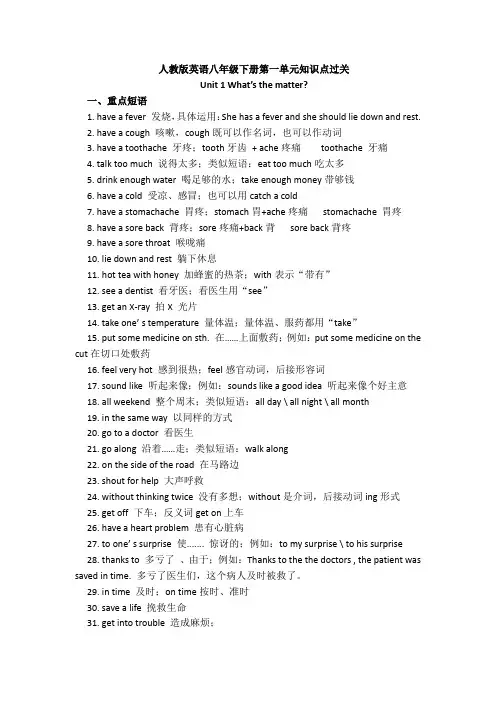
人教版英语八年级下册第一单元知识点过关Unit 1 What’s the matter?一、重点短语1. have a fever 发烧,具体运用:She has a fever and she should lie down and rest.2. have a cough 咳嗽,cough既可以作名词,也可以作动词3. have a toothache 牙疼;tooth牙齿+ ache疼痛toothache 牙痛4. talk too much 说得太多;类似短语:eat too much吃太多5. drink enough water 喝足够的水;take enough money带够钱6. have a cold 受凉、感冒;也可以用catch a cold7. have a stomachache 胃疼;stomach胃+ache疼痛stomachache 胃疼8. have a sore back 背疼;sore疼痛+back背sore back背疼9. have a sore throat 喉咙痛10. lie down and rest 躺下休息11. hot tea with honey 加蜂蜜的热茶;with表示“带有”12. see a dentist 看牙医;看医生用“see”13. get an X-ray 拍X 光片14. take one’ s temperature 量体温;量体温、服药都用“take”15. put some medicine on sth. 在……上面敷药;例如:put some medicine on the cut在切口处敷药16. feel very hot 感到很热;feel感官动词,后接形容词17. sound like 听起来像;例如:sounds like a good idea 听起来像个好主意18. all weekend 整个周末;类似短语:all day \ all night \ all month19. in the same way 以同样的方式20. go to a doctor 看医生21. go along 沿着……走;类似短语:walk along22. on the side of the road 在马路边23. shout for help 大声呼救24. without thinking twice 没有多想;without是介词,后接动词ing形式25. get off 下车;反义词get on上车26. have a heart problem 患有心脏病27. to one’ s surprise 使....... 惊讶的;例如:to my surprise \ to his surprise28. thanks to 多亏了、由于;例如:Thanks to the the doctors , the patient was saved in time. 多亏了医生们,这个病人及时被救了。
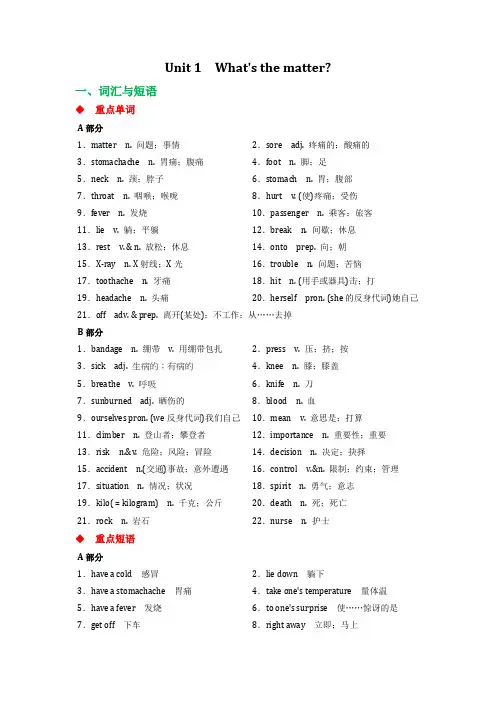
Unit 1 What's the matter?一、词汇与短语◆重点单词A部分1.matter n. 问题;事情2.sore adj. 疼痛的;酸痛的3.stomachache n. 胃痛;腹痛4.foot n. 脚;足5.neck n. 颈;脖子6.stomach n. 胃;腹部7.throat n. 咽喉;喉咙8.hurt v. (使)疼痛;受伤9.fever n. 发烧10.passenger n. 乘客;旅客11.lie v. 躺;平躺12.break n. 间歇;休息13.rest v. &n. 放松;休息14.onto prep. 向;朝15.X-ray n. X射线;X光16.trouble n. 问题;苦恼17.toothache n. 牙痛18.hit n. (用手或器具)击;打19.headache n. 头痛20.herself pron. (she的反身代词)她自己21.off adv. & prep. 离开(某处);不工作;从……去掉B部分1.bandage n. 绷带v. 用绷带包扎2.press v. 压;挤;按3.sick adj. 生病的;有病的4.knee n. 膝;膝盖5.breathe v. 呼吸6.knife n. 刀7.sunburned adj. 晒伤的8.blood n. 血9.ourselves pron. (we反身代词)我们自己10.mean v. 意思是;打算11.climber n. 登山者;攀登者12.importance n. 重要性;重要13.risk n.&v. 危险;风险;冒险14.decision n. 决定;抉择15.accident n.(交通)事故;意外遭遇16.control v.&n. 限制;约束;管理17.situation n. 情况;状况18.spirit n. 勇气;意志19.kilo( = kilogram) n. 千克;公斤20.death n. 死;死亡21.rock n. 岩石22.nurse n. 护士◆重点短语A部分1.have a cold 感冒2.lie down 躺下3.have a stomachache 胃痛4.take one's temperature 量体温5.have a fever 发烧6.to one's surprise 使……惊讶的是7.get off 下车8.right away 立即;马上9.take breaks (take a break) 休息10.talk too much 说得太多11.drink enough water 喝足够的水12.have a very sore throat 嗓子非常疼13.get an X-ray 拍X光片14.see a dentist 看牙医15.drink some hot tea with honey 喝一些加蜂蜜的热茶16.put some medicine on sth.在……上面敷一些药17.feel very hot 感到很热18.sound like 听起来像19.all weekend 整个周末20.in the same way 以同样的方式21.go to a doctor 看医生22.go along 沿着……走23.on the side of the road 在马路边24.shout for help 大声呼救25.without thinking twice 没有多想26.have a heart problem 有心脏病27.thanks to 多亏了;由于28.in time 及时29.save a life 挽救生命30.get into trouble 陷入麻烦31.hurt oneself 受伤32.fall down落下;摔倒B部分1.be used to 习惯于……;适应于……2.in a difficult situation 在困境中3.take risks (take a risk) 冒险4.keep on doing sth. 继续(或坚持)做某事5.run out (of) 用尽;耗尽6.make a decision 作出决定7.cut off 切除8.get hit on the head 撞到头部9.get out of 离开;从……岀来10.be interested in 对……感兴趣11.give up 放弃12.mean doing sth. 意味着做某事13.put a bandage on sth. 用绷带包扎…14.lose one's life 失去生命15.feel sick 感到恶心16.mountain climbing 登山运动17.have problems breathing 呼吸困难18.be in control of 掌管;管理◆重点句子A部分1.What's the matter with you?=What's the trouble with you?=What's wrong with you?你怎么了?2.What should she do? 她该怎么办呢?3.Did you fall down? 你跌倒了吗?4.Should I take my temperature? 我应该量一下体温吗?5.I think I sat in the same way for too long without moving.我想我以同样的姿势一动不动地坐得太久了。

最新人教版八年级英语下册第一单元知识点汇总Unit 1 What’s the matter?一、基础知识1.我感冒了。
可以表达为I had a cold、catch a cold或have the flu。
have a fever表示发烧,have a cough表示咳嗽,have a stomachache或肚子疼表示胃疼,have a toothache表示牙疼,have a headache表示头疼。
2.将身体部位和ache(疼痛)结合起来构成新的复合词,如stomach+ache=stomachache,head+ache=headache,tooth+ache=toothache,back+ache=backache,表示相应的疼痛。
3.“怎么啦?出什么事情了?”可以表达为What’ s the matter。
也可以用What’ s the trouble with you?或What’ s wrong with you。
matter和trouble为名词,其前可加the或形容词性物主代词,而wrong是形容词不能加the。
用于询问某人有什么病或遇到什么麻烦、问题,其后跟询问对象时,与介词with连用,如What’s the matter with sb。
= What’s your trouble?= What’s up?= What happens to sb。
举例来说,当问到“What’s the matter with you?”时,回答可以是“I have a bad cold.”4.maybe表示“或许”,常用于句首,表示可能性,后加句子。
例如Maybe you are right。
may be是情态动词+be的结构,意为“可能,也许”,后加名词、代词或形容词。
例如He maybe angry。
sound like可以和名词、代词以及从句结合使用,如It sounds like you don’t know the truth.It sounds like a good idea。
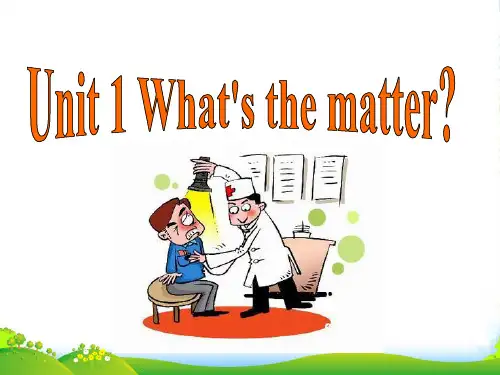
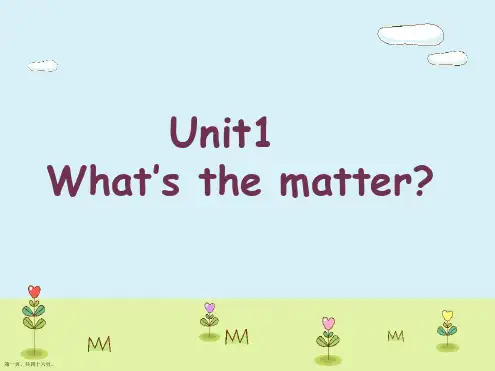
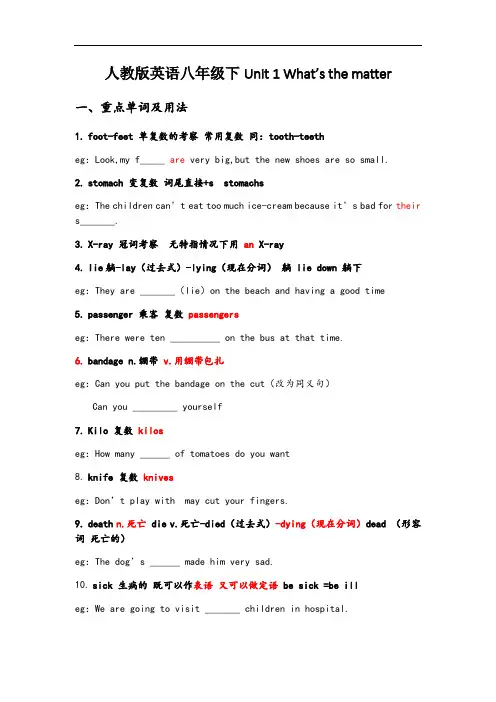
人教版英语八年级下Unit 1 What’s the matter一、重点单词及用法1.foot-feet 单复数的考察常用复数同:tooth-teetheg:Look,my f_____ are very big,but the new shoes are so small.2.stomach 变复数词尾直接+s stomachseg:The children can’t eat too much ice-cream because it’s bad for their s_______.3.X-ray 冠词考察无特指情况下用an X-ray4.lie躺-lay(过去式)-lying(现在分词)躺 lie down 躺下eg:They are _______(lie)on the beach and having a good time5.passenger 乘客复数passengerseg:There were ten __________ on the bus at that time.6.bandage n.绷带v.用绷带包扎eg:Can you put the bandage on the cut(改为同义句)Can you _________ yourself7.Kilo 复数kiloseg:How many ______ of tomatoes do you want8.knife 复数kniveseg:Don’t play with may cut your fingers.9.death n.死亡 die v.死亡-died(过去式)-dying(现在分词)dead (形容词死亡的)eg:The dog’s ______ made him very sad.10.sick 生病的既可以作表语又可以做定语 be sick =be illeg:We are going to visit _______ children in hospital.二、重点短语have a cold =catch a cold =have the flu 感冒 cough 咳嗽lie down 躺下take one’s temperature 量体温 have a fever 发烧take/have breaks/a break 休息=take/have a rest get off 下车-get on 上车to one’s surprise 令某人惊讶的是 right away 立刻马上=right nowget into (trouble)陷入(麻烦) get sunburned 被晒伤be used to (doing)习惯于适应于...... take risks/a risk 去冒险run out (of)用完用尽 cut off 切除get out of 离开从......出来 be in control of 掌管管理give up (doing)放弃(做)某事 have a stomachache 胃痛get an X-ray 做一个X射线检查 thanks to......由于多亏in time 及时 on time 准时 think about 考虑think of认为fall down 摔倒 make a decision 作决定put......on......把....放在...上 be interested in 对...感兴趣三、用法总结1.need to do sth需要做某事eg: The teacher needs_____(rest) for a few minutes.like 意为“听起来像”后接n./adj./句子eg: It sounds like a good idea.类似的感官动词+like:feel like/smell like/ look like/taste like/seem likesound+adj. 结构中,sound 是系动词意为“听起来是”后接形容词eg: That sounds great.+n./doing(v.现在分词) He went to school without having breakfast.eg:He left the classroom without ________ anythingv.同意,赞成agree with sb/某人的意见看法 Does she agree with usagree to do sth 同意做某事 They agreed to solve the problem. problems (in) doing sth做某事有困难=have trouble/difficulty (in) doinghave problems with sth =have trouble/difficulty with sth 在某方面有困难eg:One of my good friends said he had problems__________(learn) English. get used to doing sth 习惯于做某事eg:He used to get up late,but now he is used to getting up early.used to do sth 过去常常做某事(现在不做了)eg:He used to read English in the evening.use sth to do sth 使用用某物做某事eg:So he used knife to cut off his arm.be used to do sth 被动被用于做某事eg:These new pens are used to paint the wall.one’s life 丧失生命 save one’s life 挽救某人的生命eg:He lost his life in the car accident.adj.足够的充足的后接名词n. enough moneyadv.足够地修饰形容词/副词 enough要后置eg:The book is_______,but I don’t have enough money ______it.interesting; to buy enough; to buyenough; buying interesting; buying9. the importance of (doing)sth (做)某事的重要性important adj.重要的 unimportant adj.不重要的 importance n.重要性eg:We students should know the importance of (learning)English. n.决定 make a decision (to do sth)decide to do sth 决定做某事 decide not to do sth 决定不做某事eg:Tom made a decision to study English well.up 放弃give up 是动词+副词结构接代词作宾语时代词放中间eg:The problem is so difficult for you,but don’t _______A.give it up it out up it out itgive up doing sth 放弃做某事eg:You will be very sad if you give up______(sing).用法keep on doing sth 继续做某事(中间有间隔强调重复性)eg:He kept on studying though he was very tired.keep doing sth 继续不停地做某事(不间断连续性)eg:Keep walking until you reach the end of the road.keep sb doing 让某人一直做某事eg:Don’t keep the other students waiting.keep sb from doing sth 阻止某人做某事eg:We should keep the little boy from stepping on the grass.用法find找到,强调寻找的结果 look for强调寻找过程 find out找出查明eg:I was looking for my watch,but I didn’t find it.find sb doing sth 发现某人正在做某事eg:When I walked along the road,I found an old man shouting for help.find it +adj形容词+to do sth 发现做某事是...的eg:She found it hard to finish the work by herself.risks=take a risk 冒险 He likes taking risks.risk one’s life to do 冒着生命危险去做某事eg:He risked his life to save the child.risk doing stheg: The man called Tom often risks flying over the sea.四、短语辨析1.see sb doing sth 看见某人正在做某事(动作正在发生)see sb do sth 看见某人做某事(看到动作全过程或者经常看到动作发生)eg:I saw the boy crying when I passed by(路过).类似的 hear/watch/notice/find+sb do/doing sththanks to 多亏... 由于....=with the help of/with one’s help=because ofthanks for 因.......而感谢强调感谢的原因eg:Thanks to my teacher ,I passed the exam.Thanks for your help .Thanks for inviting me.2.in time 及时表示动作在规定时间内或比规定时间提前发生on time 准时按时指正好在规定时间内eg:Thanks for coming here to help me in time.The train arrived into the station on time.火车准时进站了。
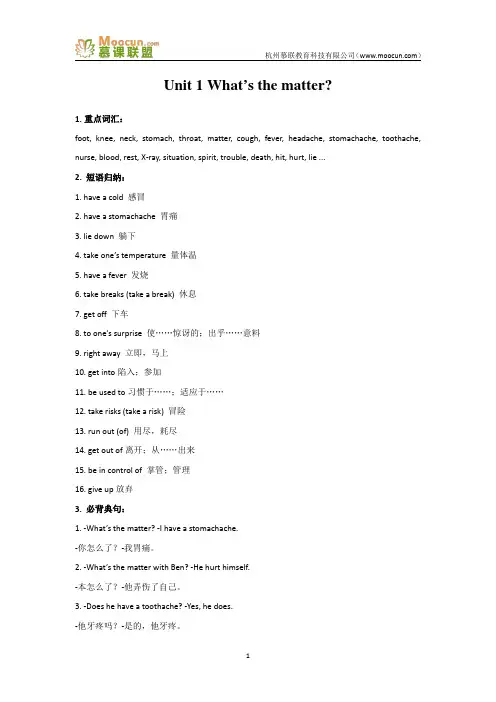
Unit 1 What’s the matter?1.重点词汇:foot, knee, neck, stomach, throat, matter, cough, fever, headache, stomachache, toothache, nurse, blood, rest, X-ray, situation, spirit, trouble, death, hit, hurt, lie ...2. 短语归纳:1. have a cold 感冒2. have a stomachache 胃痛3. lie down 躺下4. take one’s temperature 量体温5. have a fever 发烧6. take breaks (take a break) 休息7. get off 下车8. to one’s surprise 使……惊讶的;出乎……意料9. right away 立即,马上10. get into陷入;参加11. be used to习惯于……;适应于……12. take risks (take a risk) 冒险13. run out (of) 用尽,耗尽14. get out of离开;从……出来15. be in control of 掌管;管理16. give up放弃3. 必背典句:1. -What’s the matter? -I have a stomachache.-你怎么了?-我胃痛。
2. -What’s the matter with Ben? -He hurt himself.-本怎么了?-他弄伤了自己。
3. -Does he have a toothache? -Yes, he does.-他牙疼吗?-是的,他牙疼。
4. -What should she do? -She should take her temperature.-她应该做什么?-她应该量体温。
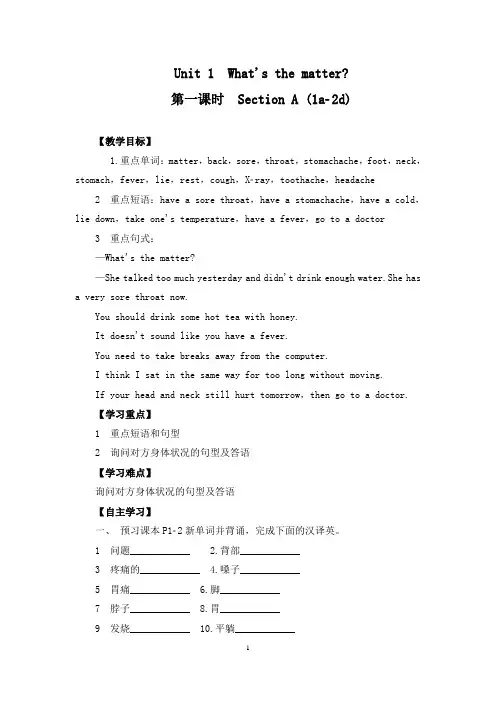
Unit 1 What's the matter?第一课时Section A (1a2d)【教学目标】1.重点单词:matter,back,sore,throat,stomachache,foot,neck,stomach,fever,lie,rest,cough,Xray,toothache,headache2 重点短语:have a sore throat,have a stomachache,have a cold,lie down,take one's temperature,have a fever,go to a doctor3 重点句式:—What's the matter?—She talked too much yesterday and didn't drink enough water.She has a very sore throat now.You should drink some hot tea with honey.It doesn't sound like you have a fever.You need to take breaks away from the computer.I think I sat in the same way for too long without moving.If your head and neck still hurt tomorrow,then go to a doctor.【学习重点】1 重点短语和句型2 询问对方身体状况的句型及答语【学习难点】询问对方身体状况的句型及答语【自主学习】一、预习课本P12新单词并背诵,完成下面的汉译英。
1 问题____________ 2.背部____________3 疼痛的____________ 4.嗓子____________5 胃痛____________ 6.脚____________7 脖子____________ 8.胃____________9 发烧____________ 10.平躺____________11 休息____________ 12.咳嗽____________13 X光____________ 14.牙疼____________15 头疼____________二、认真预习1a2d找出下列短语和句型。
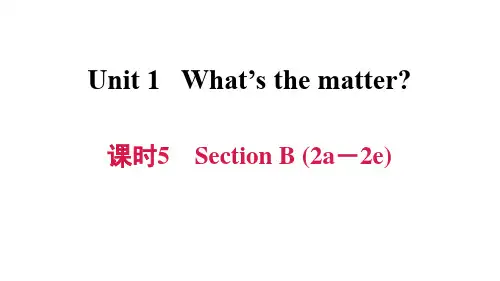
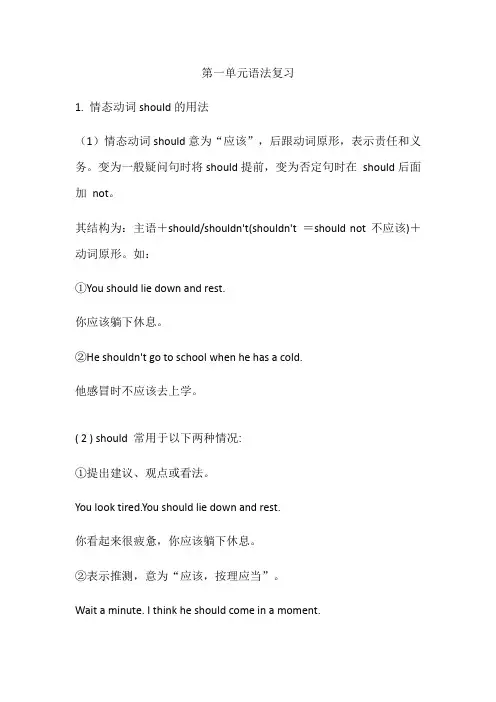
第一单元语法复习1. 情态动词should的用法(1)情态动词should意为“应该”,后跟动词原形,表示责任和义务。
变为一般疑问句时将should提前,变为否定句时在should后面加not。
其结构为:主语+should/shouldn't(shouldn't =should not不应该)+动词原形。
如:①You should lie down and rest.你应该躺下休息。
②He shouldn't go to school when he has a cold.他感冒时不应该去上学。
( 2 ) should 常用于以下两种情况:①提出建议、观点或看法。
You look tired.You should lie down and rest.你看起来很疲惫,你应该躺下休息。
②表示推测,意为“应该,按理应当”。
Wait a minute. I think he should come in a moment.请稍等一下,我想他应该马上过来。
【拓展】在英语中,表示建议的说法有很多,而且都是中考观察的重点。
主要结构有:①Would you like (to do) sth . ?你想要/愿意(做)某事吗?Would you like to play basketball with me?你想要和我一起打篮球吗?②Shall l/we do sth ?我/我们做,,好吗?Shall we go to the zoo tomorrow?明天我们去动物园,好吗?③Why not do sth ? 为什么不,,呢?Why not join us?为什么不加入到我们中间来呢?④How/What about doing sth ?做某事怎么样?How about going swimming?去游泳怎么样?⑤Let’s do sth让我们做,,吧。
Let ' s go home .我们回家吧。
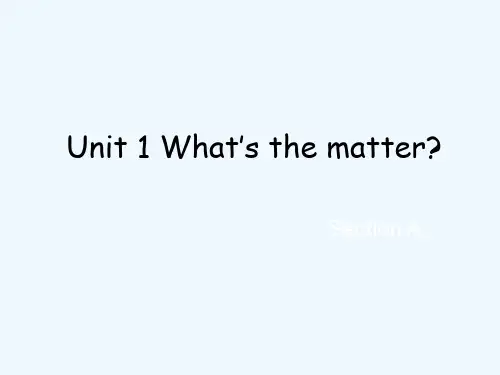
Unit1What’s the matter知识点Section A1.What’s the matter?怎么啦?出什么事情了?【解析】matter n.问题;事情What’s the matter with you?=What’s the trouble with you?=What’s wrong with you?【注】:matter和trouble为名词,其前可加the或形容词性y物主代词,wrong是adj.不能加the【用法】用于询问某人有什么病或某人遇到什么麻烦、问题其后跟询问对象时,与介词with连用。
即:What’s the matter with sb.?=What’s your trouble?=What’s up?=What happened to sb.?【拓展】matter的用法(1)It doesn’t matter没关系(用来回答别人道歉时的用语)()—I’m sorry to break your pen.—_______ A.That’s right B.It doesn’t matter C.Thank you 答案:B(2)as a matter of fact=in fact事实上,实际上2.I have a cold我感冒了I have a stomachache我患胃痛I have a sore back.我背痛。
【解析】have a cold受凉;感冒have a/an+疾病名词“患……病”(cold/fever/cough)have a sore throat患喉咙痛have a sore back患背痛have a fever发烧have a cold=catch a cold患感冒have a stomachache患胃痛have a toothache患牙痛have a headache患头痛have a backache患背痛①Mike’s sister_________________(not have)a stomachache.答案:doesn't have3.hand n.手hand in hand手拉手V.交给;传递hand in上交hand on依次传递hand out分发4.She talked too much yesterday and didn’t drink enough water.她昨天说话太多了并且没有喝足够的水。
人教版英语八年级下册第一单元知识点Unit1What’sthematter【单词】matter /'mt/n.问题;事情What’s the matter(with sb.)怎么啦出什么事情了询问有什么病或遇到什么麻烦、问题sore/s:/adj.疼痛的,酸痛的;恼怒的--have a sore back 后背痛--sore throat咽喉痛n. 溃疡,痛处;恨事pressure sore褥疮,sore spot 伤疤,痛处;伤心事,旧疮疤stomachache['stmkek] n.胃痛;腹痛stomach/'stmk/n.胃;腹部foot/ft/n.脚;足pl. feet-- on foot步行;在进行中-- at the foot of在…(山)脚下;在…的下部neck/nek/n.颈;脖子--necklace项链-- necktie领带--neck and neck(with sb.) (与…)并驾齐驱,不分上下throat/θrt/n.咽喉;喉咙fever/'fi:v/n.发烧haveafever发烧lie/la/--vi.躺, 平躺;位于,存在liedown躺下--vi.说谎,作为不及物动词的变化:-- lying,pt-- lied,pp—lied--vt. 下蛋;放置., The hen stopped laying eggs. She laid the baby down gently on the bed.作为及物动词是的变化:-- laying,pt-- lay,pp—lainrest v.&n.放松;休息cough n.&v.咳嗽射线;X光toothache /'tu:θek/n.牙痛temperature温度,体温takeone'stemperature量体温headache /'hedek/n.头痛break/brek/n.间歇;休息takebreaks(takeabreak)休息vi. vt.pt--broke,pp—broken--break away (from) 脱离,放弃(习惯),打破(陈套)--break down (机器等)坏了;(计划等)失败;(健康等)变坏;感情失去控制--break in 插嘴,使驯服--break into 破门而入,突然。
人教版八年级下册英语第一单元u n i t1知识点(总5页)-本页仅作为预览文档封面,使用时请删除本页-Unit 1 Will people have robots★语法知识归纳一、概念:表示将来某个时间要发生的动作或存在的状态,也表示将来经常或反复发生的动作,常与表示将来的时间状语连用,如tomorrow, next week, next year等。
I will go back to my hometown next week.We will come to see you every Sunday.二、构成1.肯定式:主语+will/shall/be going to +动词原形+其他will:shall:be going to:○They’ll have a test next week.○Shall we have a rest?○I’m going to write a letter to my friend.2.否定式:在will/shall/be后面加notwill+not= shall+not= is+not= are+not=将上面三个肯定句变为否定句○○○3.一般疑问句:将will/shall/be提到主语之前。
将○、○句变为一般疑问句○○★重点句子讲解you think there will be robots in pe ople’s homes?(1)本句是一个_________句,think后面接_________从句,从句的语序必须是_________语序。
引导词_______________________.(2)there will be是there be 句型的一般将来式,否定形式为___________________.一般疑问句形式是 _____________________. be going to 形式为______________________________.翻译:今晚将有一场电影。